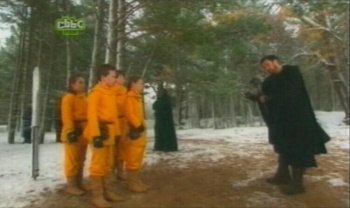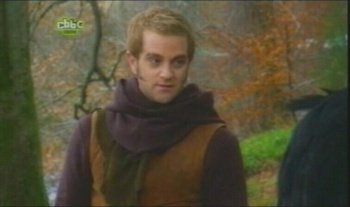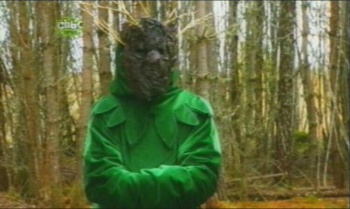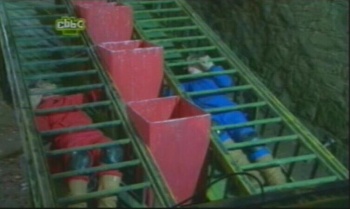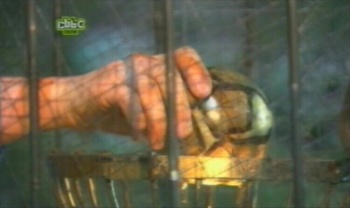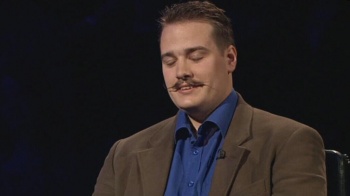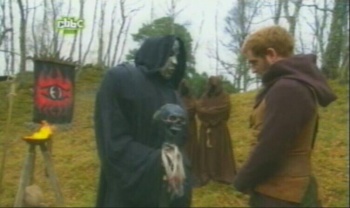Weaver's Week 2009-04-05
Last week | Weaver's Week Index | Next week
Contents |
Raven: The Dragon's Eye
CBBC, 4pm weekdays, 2-27 March
In August 2007, the UK was benighted by the most awful weather this century. The year was always winter and never Wimbledon. The spell would be broken, but it took Raven, Satyarani, and a group of very bold warriors to retrieve the magical waters from a land far far away. The weather remains one of the very few forces of nature that not even the BBC's omnipotent children's department can control, but a wonderful coincidence nevertheless.
Fast-forward to March 2009, and there's a remarkably similar format for this quest, the third team competition in Raven history. This time, the objective is to destroy The Dragon's Eye, a gemstone that is purported to turn anyone who gazes upon it into the most evil creature ever. Well, anyone except for the most pure of heart, such as a fine warrior. Nevar believes he needs an evil power-up, and wants to take this gem for his own use. Quite how this squares with the canard that Nevar is the most evil creature ever is not obvious: has Raven been over-selling Nevar's demons of mass distraction all these years? Perhaps not: as the quest progressed, some of the challenges were played in ice, snow, and other typical summer weather. The sacred waters were no match for Nevar's power, but this angle completely eluded the scriptwriters.
As in the Secret Temple, there were four teams of four, this time named after fierce creatures of the forest: bears, wolves, eagles, and (er) otters. There were still fourteen tasks to collect gemstones, failed contestants could still be bought back at a cost, and the team with the most gems were allowed to take a pass through to the Forbidden Kingdom. The tree guardians were portrayed as being harsh but fair, not wanting anyone who might be corrupted by The Dragon's Eye to see it. We can see their point.
The challenges in the gem-collecting phase were still varied, with more mental tests than we've seen in the previous series. We particularly appreciated the Magnetic Maze challenge, a bit like one of the games from The Crystal Maze only with the captain directing the rest of their team. White water rafting is spectacular, and two games involving cliffs is about enough. Not every game risked losing a team member – indeed, we reckon that only half of the challenges jeopardised anyone, with perhaps four challenges running a serious risk of claiming people.
As in the previous series, Raven has some company. Ervan (played by Daniel Jackson) used to be a member of Nevar's soldiers, but put himself across as an 'umble woodman. Is he on Raven's side, or is he secretly guiding Nevar to blast Raven with his big blasty thing. This plot, and the progress of Nevar, proceeded at an infuriating pace, not given more than a few moments per day until the final week.
Like the last proper series of Raven, this show has been shot in high-definition. To suit scheduling on the BBC-HD channels, the episodes are made to fit a half-hour slot. That leads to rather a lot of obviously-rehearsed conversation between Raven and the teams, usually along the lines of "Do you think your captain should be replaced?" "No, we're doing this as a team." "But do you think your captain should be replaced?" It's not exactly Paxman, but it's tougher questioning than anything in the previous two hundred episodes. These exchanges were heavily rehearsed, and we found the effect to be tremendously stilted, especially in comparison to the warriors' pieces to camera.
If we were being excessively uncharitable about the first three weeks, we could call this show a direct copy of Secret Temple. The colourful spirit guides have been replaced by blokes in dull wood masks, some of the detail is different, and it isn't always sunny, but that was about the total of the changes. To say there had been no progression would be inaccurate and unfair: in particular, we do appreciate the arrival of sandclocks on timed games, something we noted from the India series.
As is traditional, the last week was the best. Unlike the two previous adventures, there was actually A Plan for the final week. Exactly six places would be available in the final: the team with the most stones would progress automatically, and the remaining warriors performed a physical task for the remaining spots. The remainder of day 16 was taken up by challenges to find a leader, and a surprisingly large amount of plot exposition.
The next three days were guided by a journal that Ervan had given to the warriors. Each day had the usual combination of mental and physical challenges, and concluded with a task that could be turned into a race. If there were no eliminations during the day, the loser of this final challenge would find their quest at an end. There was further exposition of the Raven / Nevar / Ervan plot, which helped to spin the action out without obviously playing for time. We were less convinced by the journal: not only was Raven already suspicious of Ervan, but it led to games being explained twice. Raven would explain the game, then the contestants would explain the same game by reading from the book. It dragged on a little.
The final day had us wondering if we'd set the video wrongly and recorded Fort Boyard Junior avec Corbeau, his nemesis Breauco, and the strange woodsman O'Rebcau. The remaining contestants were playing a memory game similar to one of the Dog Eat Dog finales, then had to rootle around in concealed boxes searching for a key. It's almost as if they were playing a version of the game where the shrieking woman dips her hand into a jar of mice, and by putting the contenders in a metal cage, making M. Boyard look like a softy. We noted in December that some of the newer games were hard and challenging enough to feature on the king of French shows, and so was this final day.
The winner was found, the day was saved, the eye – protected by rats and a scorpion – released. Ervan was destroyed, and – once again – Raven thinks that Nevar has been consigned to the history books. That's not going to happen, Nevar has made more comebacks than Status Quo, and is only slightly less welcome.
As much as we like Raven, the current format of its spin-offs leaves a little to be desired. There's three weeks of moderate interest before the adventure really kicks in. Is there scope for something a little more complex, perhaps with each team looking for clues and honing their skills for the final challenge. We must remember that children understood and appreciated Knightmare in its heyday, and will be even more familiar with the grammar of interactive fiction and computer games. In fairness, Knightmare hasn't stood the test of time as a television spectacle, but there is surely scope for a longer structured adventure.
We're carping a lot here, and it's unfair. Even from being many times over the target age, we did enjoy The Dragon's Eye, and certainly find it more rewarding than much of the guff thrown at grown-ups.
Mastermind
Heat 23
Ninety-six years ago, is that how long this series began? No, it was only 5 September, when Lehman Brothers was still a bank, Iceland still a fashionable place to put your life savings, and John Humphrys had a full head of hair.
Andrew Weston will take the Novels of George Orwell. Readers may remember him from such works as Animal Farm, but mostly as a scriptwriter on Big Brother. The host is right to allow a slight slip in "four legs good, two legs bad", and the contender recalls that Room 101 was based on a part of Broadcasting House. It's probably the place where they kept Jonathan Ross for three months. 12 (1).
Tony Black has the Life and Music of Gram Parsons. Readers will know him as a former member of The Byrds, solo guitarist, singer, songwriter, but mostly as a corpse whose body was stolen and buried at Joshua Tree, thus inspiring an impossibly self-important album by that well-known band of tax-dodgers U2. We digress, the contender didn't, and turned in a very good round, 15 (1).
Frank Minns will take Italian Politics, 1944-1994. Like finding a single sensible web link to cover this subject, this is surely an impossible task. The Italians specialised in forming completely unstable governments, which usually collapsed as soon as the wind changed. After a string of scandals, the system was reformed into one where anyone could become prime minister, so long as he was called Berlusconi. The round ends on 13 (3).
Finally, Richard Griffiths will tell us about the Life and Works of Shostakovitch. Dimitri was a composer during the Soviet Union phase of Russian history, writing music that buried deep ideas beneath simplistic motifs. The round is perhaps more on the Life than Works, and ends on 11 (2).
With a good score in a great week, Mr. Griffiths is back in the chair within moments, and discusses his job as a security guard at a Manchester hospital. The round begins very slowly, and just as the contender is beginning to pick up speed, the time expires and his score is 17 (7).
Mr. Weston is also not questioned about his specialist subject, but about his moustache. We're going to have to include a photograph of this, aren't we.
Every point counts for these contenders, even the ones picked up by admitting that one remembers Geri Halliwell's dire cover of "It's raining men". He also confuses Terpischoire, the muse of dance and dramatic arts, with BRIAN BLESSED, the well-heard voice. We were about to seek a picture of BRIAN BLESSED dancing, but someone reminded us that we'd already been retrieved from an impossible task once, and not again. The round ends on 19 (5).
Mr. Minns confirms that the extreme changes of government stopped in 1994, because no-one could possibly achieve an overall majority. Pietro della Nevi would never have let his swingometer go rusty. Has the Kirov Ballet changed its name? Wouldn't surprise us, especially if they're taking BRIAN BLESSED as a muse. The round proceeds at a cracking pace, ending on 27 (7).
Mr. Black hears that the host never knew of Gram Parsons until now. Seriously? The man who bridged country and rock like a bridge going between rock and country? Next thing we know, young Mr. Humphrys will say he's never heard of Reg "Reg" Snipton, or heard BRIAN BLESSED. The guesses count: the contender correctly surmises than a woman was nominated as US President in 1880. The round has few other guesses, ending on 24 (6).
This Week And Next
Alan Sugar's latest self-promotional series has only just started, and already he's winding us up. As we saw in the opening week, one contestant dropped out before recording started. For Mr. Sugar to tell his supplicants that this person has "bottled it" is entirely out of order. This is still a free country, people are entitled to do as they please. If someone doesn't want to take part in Mr. Sugar's little games, they're not obliged to. If someone wishes to withdraw from a tawdry spectacle, they may do so, and they should not be penalised further than by losing the opportunity to win. It is entirely wrong to speculate as to the motives of people who withdrew. Mr. Sugar may believe that the best way to get ahead is to attack people who have no opportunity to respond. We believe that to be the mark of a coward.
One Versus One Hundred returned on Saturday night, complete with evening wear that would be entirely in place at the Bad Shirt Casino. The show has moved to a new studio in Glasgow, and we note that the sides of the Hundred are entirely cut off for analogue viewers. This may be the first game show where a widescreen set (or at least a set capable of seeing digital widescreen transmissions) is required.
Bit of Research of the Week comes from one of the questions from last week's edition: the bare statement that, in Hebrew myth, Lilith was a wife of Adam. It's a debatable statement; the prime source is an eleventh-century document that may or may not be part of the regular mythos. Lilith appears in various parts of Hebrew folklore, most commonly as a demon out to corrupt men. The claim that she was Adam's first wife is generally sourced to the Alphabet of Ben Sira, a medieval document of dubious provenance. It may have been a codification of non-scripture myths, it may have been a very witty satire, it may have been a smear against Jewish believers, and – given the document's obsession with flatulence and toilet humour – it may have been something along the lines of Samuel and Simeon in da Shul. Ahem. Either way, the Alphabet and its claims are generally regarded as being on the extremes of Jewish thought.
All of this scholarly debate proves one thing, and one thing only: no-one ever learned anything by watching The Colour of Money.
The University Challenge Boat Race was won by Oxford, who pulled away from Cambridge in the second half of the game after a neck-and-neck opening. The contest was marred by suspicions that the teams were full of ringers, people who had only joined the university so that they could appear on international television, so we expect both teams to be disqualified and the title awarded to the University of Lunn.
With all the inevitability of the Take That reunion tour, Shooting Stars is to return to BBC2 this autumn. Six episodes will be screened.
There was a similar inevitability to ratings in the week to 22 March. The Dancing on Ice final swept all before it, 11.3m tuning in for the result. Saturday Night Takeaway also reached the end of its series, just 6.4m tuned in as we wondered if the format was losing its surprise. Total Wipeout had 6.1m viewers, and The Colour of Money (4.25m) was less popular than QI (4.9m). Genius made its BBC2 debut and attracted 1.7m viewers. On the cable channels, Come Dine With Me led with 775,000. Paris Hilton's British Best Friend was seen by 635,000 people who though the channel was showing something interesting, and QI on Dave had its best for the year, 570,000.
Next week's new shows include a search for Britain's best young orator in The Speaker (BBC2, 8pm Tuesday and Wednesday). Radio 2 returns to the quiz circuit for the first time in yonks, I'm Spartacus (10.30 Thursday) is a film quiz, and next Saturday sees the return of Britain's Got Talent (ITV, 7.45). Highlight is the final of Côr Cymru (S4C, 7.30 tonight).
To have Weaver's Week emailed to you on publication day, receive our exclusive TV roundup of the game shows in the week ahead, and chat to other ukgameshows.com readers sign up to our Yahoo! Group.

